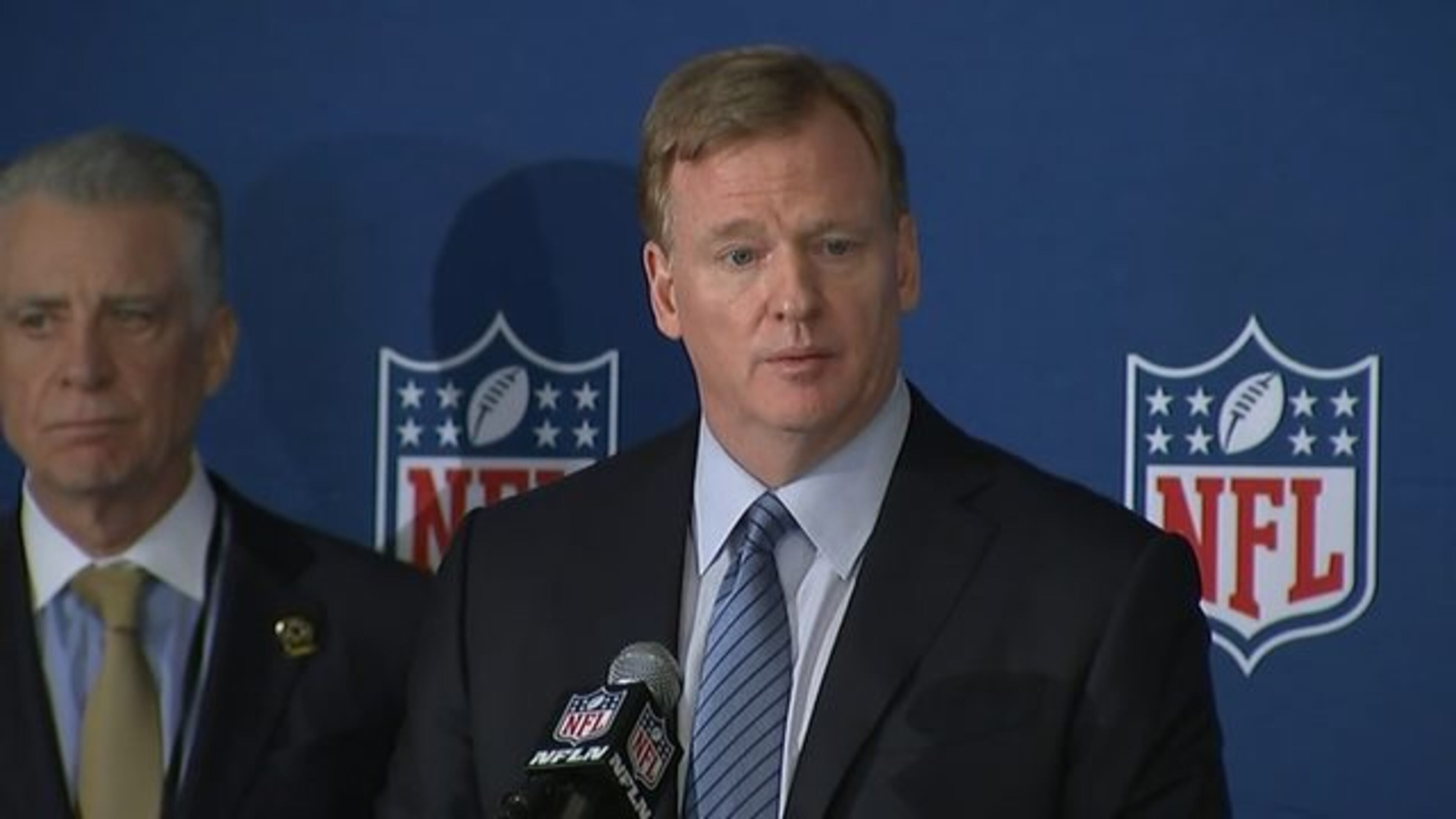NFL wants anthem protesters to stay out of sight. Will this work?

It’s not a problem, anymore. At least until it’s a problem again.
It’s not a problem, anymore. At least until NFL players en masse feel compelled to exercise their First Amendment rights in public view and not hidden in the shelter of a locker room, as the league’s commissioner and owners and image consultants prefer. Because kneeling or looking “disrespectful” during the national anthem is no longer allowed, even if the emotions and acts are driven by logical reasons.
NFL owners reached their two objectives Wednesday: They passed an anthem policy. They did it before lunch. So this allowed them to flee an Atlanta hotel for their private jets and get out of town, believing their jobs were done. But how much did they really accomplish?
As Falcons owner Arthur Blank predicted to the Atlanta Journal-Constitution on Tuesday night, the league's owners voted unanimously to mandate that players stand for the national anthem. But as if to offer some sort of compromise, given the backdrop of social-justice protests, players who feel the need to protest may stay in the locker room or a stadium corridor, out of view of fans and TV cameras during the "Star Spangled Banner."
John Carlos and Tommie Smith would not approve.
If a player protests on the field, his team, not the player, will be fined by the league. It will be up to the individual team whether to fine or punish a player. But let’s be real -- that’s never going to happen. The owner and, by association, that team’s front office, would be ostracized by every free agent in the league.
This obviously is a complex issue. There really was no decision the NFL could have made to avoid criticism. There’s a school of thought that owners could have done nothing, effectively kicking the can down the road, especially given that there’s only a handful of players still protesting. But then the league would’ve been criticized for avoiding making a decision, trying not to upset any of the groups that obviously are most important to them: owners, players, fans, television networks, sponsors, sponsors. (I felt the need to type that one twice.)
Here’s the problem: The next time there’s social unrest following a case of police brutality or somebody’s Constitutional rights being violated, the next time President Donald Trump says something divisive and inflames an issue (3, 2, 1...) -- many players may feel the need to speak out or act out during the anthem.
Then what’s the league going to do?
Blank believes the recent dialogue between owners and players and partnership on social action initiatives has eliminated most of the need to protest.
“I would feel very disappointed (if a player protested),” he said Tuesday. “We’re working together on a lot of stuff to address the issues. The issues haven’t been resolved, but the goal has been achieved and that’s to work together to find solutions. But it will take time.”
He is right about that. Today. But what about tomorrow? What can’t be predicted is the ripple effect after the next issue explodes. Or the one after that.
NFL commissioner Roger Goodell said at Wednesday’s announcement, “Clearly our objective as a league is we want people to be respectful of the national anthem. We want people to stand. We want people to treat the flag in respectful fashion.”
He stood at the front of a ballroom between four of the league’s owners: Cleveland’s Jimmy Haslam, Pittsburgh’s Art Rooney II, Arizona’s Michael Bidwell and Green Bay’s Mark Murphy. All four spoke briefly on the new policy. They hope this allows the NFL to, as a Bidwell said, get “the focus back on football.”
Not so fast. The NFL Players Association is not happy that league owners, for all the lip service given to working through issues together, was not consulted on the new policy. In fact, in the union's statement, twice put the word "policy" in quotes as an obvious jab.
From the statement: “NFL players have shown their patriotism through their social activism, their community service, in support of our military and law enforcement and yes, through their protests to raise awareness about the issues they care about.” It believes the vote “contradicts” previous league and owner statements.
Goodell bristled when told of the NFLPA’s objection. He said “tens to hundreds” of players have provided feedback over the past several months, adding: “Anything I have to say to the union, I’ll say to them directly.”
Well. This is off to a great start.
It’s not over. It’s miles of protests and at least one lawsuit from being. This all started when Colin Kaepernick, then an employed NFL quarterback for the San Francisco 49ers, sat during the national anthem before an exhibition game in August 2016. Kaepernick became a pariah among NFL owners. So did former 49ers teammates Eric Reid.
Kaepernick, still better than many NFL backup quarterbacks, was not signed by anybody for the 2017 season, nor since. Reid, a 26-year-old safety and five-year starter, is unsigned now. They have a collusion case against the NFL and several officials have been deposed. It’s already an ugly situation and it’s going to get worse.
NFL owners didn’t end this anthem issue. They only stuck a Band-Aid on it, while publicly wrapping themselves in the flag. How long that wound stays covered depends on whether protesting players agree to play nice and stay out of sight.
Earlier: Arthur Blank expects agreement on NFL players standing for anthem
Listen to the, "We Never Played The Game" podcast. Check out the podcast show page at AJC.com/sports-we-never-played-the-game. Subscribe on iTunes. Also on Google play. Also via Stitcher or via TuneIn, or via the AJC sports podcasts, or the WSB Radio on-demand page.

